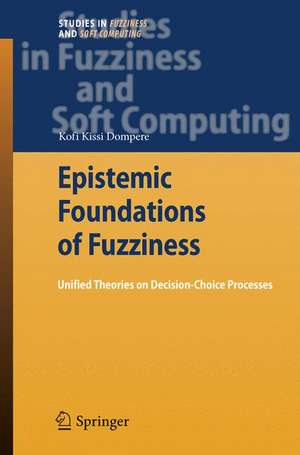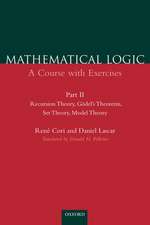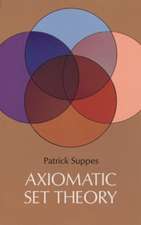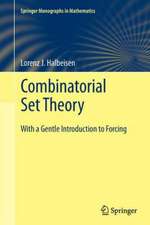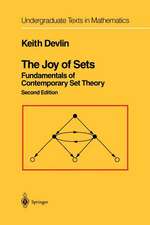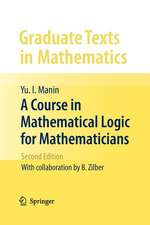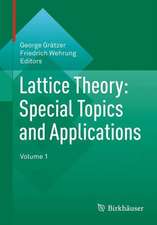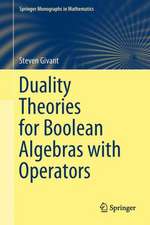Epistemic Foundations of Fuzziness: Unified Theories on Decision-Choice Processes: Studies in Fuzziness and Soft Computing, cartea 236
Autor Kofi Kissi Dompereen Limba Engleză Hardback – 20 mar 2009
| Toate formatele și edițiile | Preț | Express |
|---|---|---|
| Paperback (1) | 944.19 lei 6-8 săpt. | |
| Springer Berlin, Heidelberg – 21 oct 2010 | 944.19 lei 6-8 săpt. | |
| Hardback (1) | 950.21 lei 6-8 săpt. | |
| Springer Berlin, Heidelberg – 20 mar 2009 | 950.21 lei 6-8 săpt. |
Din seria Studies in Fuzziness and Soft Computing
- 20%
 Preț: 999.85 lei
Preț: 999.85 lei - 20%
 Preț: 653.06 lei
Preț: 653.06 lei - 20%
 Preț: 872.98 lei
Preț: 872.98 lei - 20%
 Preț: 930.57 lei
Preț: 930.57 lei - 20%
 Preț: 1051.00 lei
Preț: 1051.00 lei - 20%
 Preț: 992.44 lei
Preț: 992.44 lei - 20%
 Preț: 655.85 lei
Preț: 655.85 lei - 20%
 Preț: 1001.86 lei
Preț: 1001.86 lei - 18%
 Preț: 954.14 lei
Preț: 954.14 lei - 20%
 Preț: 330.10 lei
Preț: 330.10 lei - 20%
 Preț: 333.04 lei
Preț: 333.04 lei - 20%
 Preț: 997.56 lei
Preț: 997.56 lei -
 Preț: 391.61 lei
Preț: 391.61 lei - 20%
 Preț: 647.79 lei
Preț: 647.79 lei - 20%
 Preț: 986.01 lei
Preț: 986.01 lei - 18%
 Preț: 958.56 lei
Preț: 958.56 lei - 20%
 Preț: 996.40 lei
Preț: 996.40 lei - 20%
 Preț: 999.35 lei
Preț: 999.35 lei - 15%
 Preț: 646.43 lei
Preț: 646.43 lei - 20%
 Preț: 651.57 lei
Preț: 651.57 lei - 20%
 Preț: 997.89 lei
Preț: 997.89 lei - 15%
 Preț: 641.03 lei
Preț: 641.03 lei - 20%
 Preț: 1009.74 lei
Preț: 1009.74 lei - 20%
 Preț: 992.62 lei
Preț: 992.62 lei -
 Preț: 388.72 lei
Preț: 388.72 lei - 18%
 Preț: 1223.43 lei
Preț: 1223.43 lei - 20%
 Preț: 651.42 lei
Preț: 651.42 lei - 18%
 Preț: 951.59 lei
Preț: 951.59 lei - 18%
 Preț: 948.61 lei
Preț: 948.61 lei
Preț: 950.21 lei
Preț vechi: 1158.79 lei
-18% Nou
Puncte Express: 1425
Preț estimativ în valută:
181.84€ • 197.46$ • 152.75£
181.84€ • 197.46$ • 152.75£
Carte tipărită la comandă
Livrare economică 22 aprilie-06 mai
Preluare comenzi: 021 569.72.76
Specificații
ISBN-13: 9783540880844
ISBN-10: 3540880844
Pagini: 288
Ilustrații: XXII, 264 p.
Dimensiuni: 155 x 235 x 25 mm
Greutate: 0.58 kg
Ediția:2009
Editura: Springer Berlin, Heidelberg
Colecția Springer
Seria Studies in Fuzziness and Soft Computing
Locul publicării:Berlin, Heidelberg, Germany
ISBN-10: 3540880844
Pagini: 288
Ilustrații: XXII, 264 p.
Dimensiuni: 155 x 235 x 25 mm
Greutate: 0.58 kg
Ediția:2009
Editura: Springer Berlin, Heidelberg
Colecția Springer
Seria Studies in Fuzziness and Soft Computing
Locul publicării:Berlin, Heidelberg, Germany
Public țintă
ResearchCuprins
General Epistemics on Science and Rationality.- Information and Knowledge in Decision-Choice Rationality.- Decision, Choice and Rationality.- Ideology and Decision-Choice Rationalities.- Ideology and Decision-Choice Rationalities.- Decision, Choice and Rationality.
Textul de pe ultima copertă
This monograph is a treatment on optimal fuzzy rationality as an enveloping of decision-choice rationalities where limited information, vagueness, ambiguities and inexactness are essential characteristics of our knowledge structure and reasoning processes. The volume is devoted to a unified system of epistemic models and theories of decision-choice behavior under total uncertainties composed of fuzzy and stochastic types. The unified epistemic analysis of decision-choice models and theories begins with the question of how best to integrate vagueness, ambiguities, limited information, subjectivity and approximation into the decision-choice process. The answer to the question leads to the shifting of the classical paradigm of reasoning to fuzzy paradigm. This is followed by discussions and establishment of the epistemic foundations of fuzzy mathematics where the nature and role of information and knowledge are explicated and represented.
The epistemic foundation allows total uncertainties that constrain decision-choice activities, knowledge enterprise, logic and mathematical structures as our cognitive instruments to be discussed in reference to the phenomena of fuzzification, defuzzification and fuzzy logic. The discussions on these phenomena lead us to analyze and present models and theories on decision-choice rationality and the needed mathematics for problem formulation, reasoning and computations. The epistemic structures of two number systems made up of classical numbers and fuzzy numbers are discussed in relation to their differences, similarities and relative relevance to decision-choice rationality. The properties of the two number systems lead to the epistemic analysis of two mathematical systems that allow the partition of the mathematical space in support of decision-choice space of knowledge and non-knowledge production into four cognitively separate but interdependent cohorts whose properties are analyzed by the methods and techniques of category theory. The four cohorts are identified as non-fuzzy and non-stochastic, non-fuzzy and stochastic both of which belong to the classical paradigm and classical mathematical space; and fuzzy and non-stochastic, and fuzzy and stochastic cohorts both of which belong to the fuzzy paradigm and fuzzy mathematical space. The differences in the epistemic foundations of the two mathematical systems are discussed. The discussion leads to the establishment of the need for fuzzy mathematics and computing as a new system of reasoning in both exact and inexact sciences.
The mathematical structures of the cohorts are imposed on the decision-choice process to allow a grouping of decision-choice models and theories. The corresponding classes of decision-choice theories have the same characteristics as the logico-mathematical cohorts relative to the assumed information-knowledge structures. The four groupings of models and theories on decision-choice activities are then classified as: 1) non-fuzzy and non-stochastic class with exact and full information-knowledge structure (no uncertainty), 2) non-fuzzy and stochastic class with exact and limited information-knowledge structure (stochastic uncertainty), 3) fuzzy and non-stochastic class with full and fuzzy information-knowledge structure (fuzzy uncertainty) and 4) Fuzzy and stochastic class with fuzzy and limited information-knowledge structure (fuzzy and stochastic uncertainties). All these different classes of decision choice problems have their corresponding rationalities which are fully discussed to present a unified logical system of theories on decision-choice process.
The volume is concluded with epistemic discussions on the nature of contradictions and paradoxes viewed as logical decision-choice problems in the classical paradigm, and how these contradictions and paradoxes may be resolved through fuzzy paradigm and the methods and techniques of optimal fuzzy decision-choice rationality. The logical problem of sorites paradox with its resolution is given as an example. Interested audience includes those working in the areas of economies, decision-choice theories, philosophy of sciences, epistemology, mathematics, computer science, engineering, cognitive psychology, fuzzy mathematics and mathematics of fuzzy-stochastic processes.
The epistemic foundation allows total uncertainties that constrain decision-choice activities, knowledge enterprise, logic and mathematical structures as our cognitive instruments to be discussed in reference to the phenomena of fuzzification, defuzzification and fuzzy logic. The discussions on these phenomena lead us to analyze and present models and theories on decision-choice rationality and the needed mathematics for problem formulation, reasoning and computations. The epistemic structures of two number systems made up of classical numbers and fuzzy numbers are discussed in relation to their differences, similarities and relative relevance to decision-choice rationality. The properties of the two number systems lead to the epistemic analysis of two mathematical systems that allow the partition of the mathematical space in support of decision-choice space of knowledge and non-knowledge production into four cognitively separate but interdependent cohorts whose properties are analyzed by the methods and techniques of category theory. The four cohorts are identified as non-fuzzy and non-stochastic, non-fuzzy and stochastic both of which belong to the classical paradigm and classical mathematical space; and fuzzy and non-stochastic, and fuzzy and stochastic cohorts both of which belong to the fuzzy paradigm and fuzzy mathematical space. The differences in the epistemic foundations of the two mathematical systems are discussed. The discussion leads to the establishment of the need for fuzzy mathematics and computing as a new system of reasoning in both exact and inexact sciences.
The mathematical structures of the cohorts are imposed on the decision-choice process to allow a grouping of decision-choice models and theories. The corresponding classes of decision-choice theories have the same characteristics as the logico-mathematical cohorts relative to the assumed information-knowledge structures. The four groupings of models and theories on decision-choice activities are then classified as: 1) non-fuzzy and non-stochastic class with exact and full information-knowledge structure (no uncertainty), 2) non-fuzzy and stochastic class with exact and limited information-knowledge structure (stochastic uncertainty), 3) fuzzy and non-stochastic class with full and fuzzy information-knowledge structure (fuzzy uncertainty) and 4) Fuzzy and stochastic class with fuzzy and limited information-knowledge structure (fuzzy and stochastic uncertainties). All these different classes of decision choice problems have their corresponding rationalities which are fully discussed to present a unified logical system of theories on decision-choice process.
The volume is concluded with epistemic discussions on the nature of contradictions and paradoxes viewed as logical decision-choice problems in the classical paradigm, and how these contradictions and paradoxes may be resolved through fuzzy paradigm and the methods and techniques of optimal fuzzy decision-choice rationality. The logical problem of sorites paradox with its resolution is given as an example. Interested audience includes those working in the areas of economies, decision-choice theories, philosophy of sciences, epistemology, mathematics, computer science, engineering, cognitive psychology, fuzzy mathematics and mathematics of fuzzy-stochastic processes.
Caracteristici
Presents the essential structure of optimal fuzzy rationality in decision-choice actions and its philosophical and mathematical foundations Defines a framework for unified epistemic models of decision-choice processes Focuses on theory of knowledge and the role of fuzzy paradigm and fuzzy rationality
